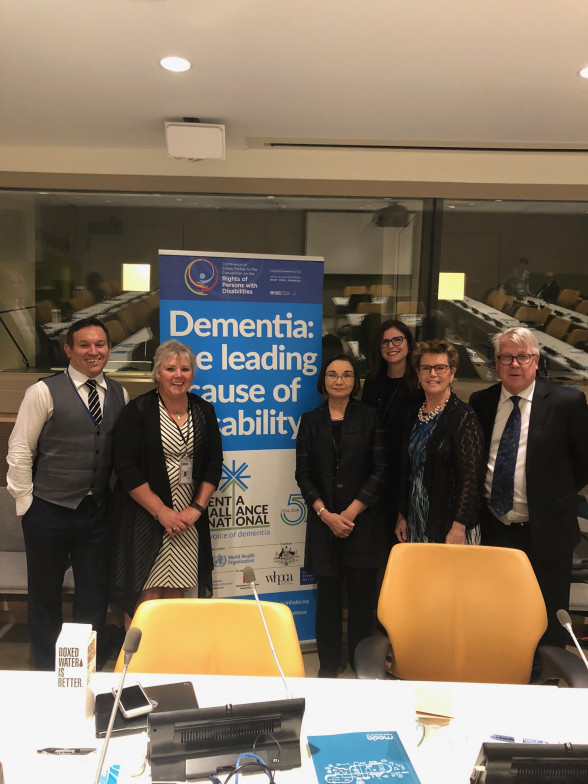We hope the time spent by DAI members and our volunteer last week in New York attending the 12th Session of the Conference Of State Parties (COSP12) on the Convention on the Rights of Persons with Disabilities (CRPD) will have far reaching benefits for all people with dementia, now and into the future.
It is imperative we all work towards ensuring that dementia is recognised by all as a condition causing acquired cognitive and other disabilities, and therefore one that people diagnosed with dementia must be provided with full and equal access to the CRPD and other Conventions, and to Universal Health Care.
Here, we highlight the link to the live recording of the DAI Side Event, and provide the DAI Side Event Concept note and the DAI Handout provided on the day. Please share and download as you wish.
We also wish to thank the United Nations and the World Health Organisation for supporting our event, and acknowledge our co sponsors, the Australian Government, the International Disability Alliance, Alzheimer’s Disease International, Human Rights Watch, the Global Rehabilitation Alliance and the World Hospice and Palliative Care Alliance.We also thank our two sponsors, Alzheimer’s Disease International and Boehringer Ingelheim.
We especially thank Ms Catalina Devandas Aguilar, the UN Special Rapporteur on the rights of persons with disabilities for her opening remarks, and all other speakers.
It was a rich discussion on dementia as a disability, on people with dementia as rights bearers, and of the rights of all, including people with dementia to rehabilitation and other services, and to full and equal access to the CRPD
The overarching theme was social inclusion and health, two determinants of well-being, both of which are being systematically denied to people with dementia all around the world. Dementia had never been represented formally in a Side Event ever before at the COSP, hence why DAI felt it was so important.
Our disabilities may be more invisible than many others, but we are still, even in 2019, being stigmatised and discriminated against on a daily basis, and we hope this event will be the start of change for the more than 50 million people currently living with dementia, and every person being newly diagnosed every 3.2 seconds.
As an organisation DAI intends to continue to work towards others joining our campaign that dementia is a condition causing acquired cognitive and other disabilities, and for full and equal access to the CRPD and other Conventions, so that no one is left behind, including people with dementia. Rehabilitation, and all other health and disability services and support are essential for maintaining independence and dignity, for longer, and whilst dementia is a terminal condition, we should not all be ‘dying at diagnosis’.
A number of blogs were published last week, including the statements made by Kate Swaffer and Christine Thelker.
